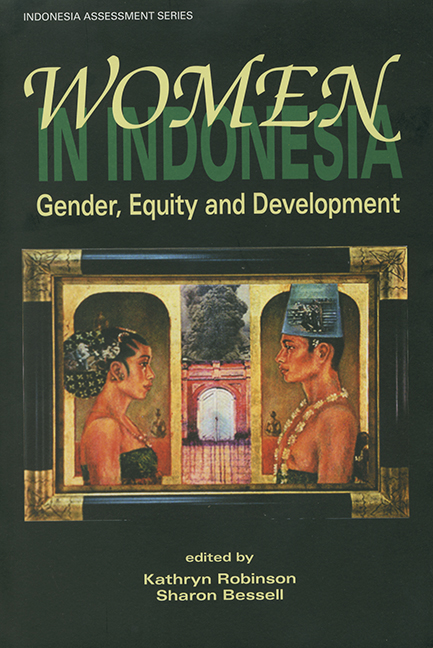Book contents
- Frontmatter
- Contents
- Tables
- Figures
- Contributors
- Acknowledgments
- Glossary
- Prologue
- 1 Introduction to the Issues
- 2 The Mega Factor in Indonesian Politics: A New President or a New Kind of Presidency?
- 3 The Downfall of President Abdurrahman Wahid: A Return to Authoritarianism?
- 4 The Year in Review: From Blind Man's Bluff to Mega Expectations
- 5 Further Comments on the Economy, with a Gender Perspective
- 6 Institution Building: An Effort to Improve Indonesian Women's Role and Status
- Commentary
- 7 Feminism in Indonesia in an International Context
- 8 Gay and Lesbi Subjectivities, National Belonging and the New Indonesia
- 9 And the Winner Is … Indonesian Women in Public Life
- 10 Indonesian Women Artists: Transcending Compliance
- 11 Literature, Mythology and Regime Change: Some Observations on Recent Indonesian Women's Writing
- 12 Women and the Labour Market during and after the Crisis
- 13 Women's International Labour Migration
- 14 Customary Institutions, Syariah Law and the Marginalisation of Indonesian Women
- 15 Women's Grassroots Movements in Indonesia: A Case Study of the PKK and Islamic Women's Organisations
- 16 Women's Activism against Violence in South Sulawesi
- 17 Gender Mainstreaming and Sex-disaggregated Data
- 18 The Changing Indonesian Household
- 19 Women, Family Planning and Decentralisation: New Variations on Old Themes
- 20 Men, Women and Community Development in East Nusa Tenggara
- References
- Index
- INDONESIA ASSESSMENT SERIES
8 - Gay and Lesbi Subjectivities, National Belonging and the New Indonesia
Published online by Cambridge University Press: 21 October 2015
- Frontmatter
- Contents
- Tables
- Figures
- Contributors
- Acknowledgments
- Glossary
- Prologue
- 1 Introduction to the Issues
- 2 The Mega Factor in Indonesian Politics: A New President or a New Kind of Presidency?
- 3 The Downfall of President Abdurrahman Wahid: A Return to Authoritarianism?
- 4 The Year in Review: From Blind Man's Bluff to Mega Expectations
- 5 Further Comments on the Economy, with a Gender Perspective
- 6 Institution Building: An Effort to Improve Indonesian Women's Role and Status
- Commentary
- 7 Feminism in Indonesia in an International Context
- 8 Gay and Lesbi Subjectivities, National Belonging and the New Indonesia
- 9 And the Winner Is … Indonesian Women in Public Life
- 10 Indonesian Women Artists: Transcending Compliance
- 11 Literature, Mythology and Regime Change: Some Observations on Recent Indonesian Women's Writing
- 12 Women and the Labour Market during and after the Crisis
- 13 Women's International Labour Migration
- 14 Customary Institutions, Syariah Law and the Marginalisation of Indonesian Women
- 15 Women's Grassroots Movements in Indonesia: A Case Study of the PKK and Islamic Women's Organisations
- 16 Women's Activism against Violence in South Sulawesi
- 17 Gender Mainstreaming and Sex-disaggregated Data
- 18 The Changing Indonesian Household
- 19 Women, Family Planning and Decentralisation: New Variations on Old Themes
- 20 Men, Women and Community Development in East Nusa Tenggara
- References
- Index
- INDONESIA ASSESSMENT SERIES
Summary
SEXUAL AND GENDERED SUBJECT-POSITIONS IN INDONESIA
At a seminar held at the Australian National University in September 2001, Amien Rais stated that for democracy to work in Indonesia's era reformasi (era of reform), it must include all groups in society, even those that are ignored or hated. The underlying question of this chapter responds to this train of thought, asking: ‘What will the place of gay and lesbi Indonesians be in the present era reformasi?’
For the last ten years I have been studying lesbi and gay subject-positions in contemporary Indonesia, primarily but not solely in Java, Sulawesi and Bali. I define ‘subject-positions’ as the historically and culturally specific categories of selfhood through which persons come to know themselves as individuals and as members of communities and societies. ‘Subjectivities’ are the ways in which persons occupy one or more subject-positions in a variety of ways (for example, partially or completely, antagonistically or amicably). This theoretical language offers a more nuanced framework than the somewhat problematic term ‘identity’, which for many implies a kind of conscious alignment that does not square with the incompletely intentional ways that people understand their place in the world.
We find in contemporary Indonesia many other ‘genres’ of sexual/gendered subject-position in addition to lesbi and gay. For instance, there is waria (known popularly by a wide variety of terms, most notably banci); this is a nationwide, male-to-female, transvestite subject-position whose history is still poorly understood, but is most likely about 250 years old. There are what I call ‘ethnolocalised homosexual and transgendered professional subject-positions’ (ETPs), which include such things as warok–gemblak relations in eastern Java – that is, sexual relations between male actors (warok) and their younger male understudies (gemblak) (see Wilson 1999) – or, to some extent, bissu (ritual Bugis priests, many of whom have historically been male transvestites; see Pelras 1996: 82) practitioners in southern Sulawesi. Many of these ETPs have histories going back several centuries. There are also female-to-male transgendered persons, known most often as tomboy or hunter, whose subjectivities are complexly linked to those of lesbi women. Finally, and perhaps most importantly, there are those people called normal, that is, ‘heterosexual’ men and women. While the sexual subject-positions of these persons are often assumed to be natural or biological, they are in fact historically and culturally specific as well.
- Type
- Chapter
- Information
- Women in IndonesiaGender, Equity and Development, pp. 92 - 99Publisher: ISEAS–Yusof Ishak InstitutePrint publication year: 2002

